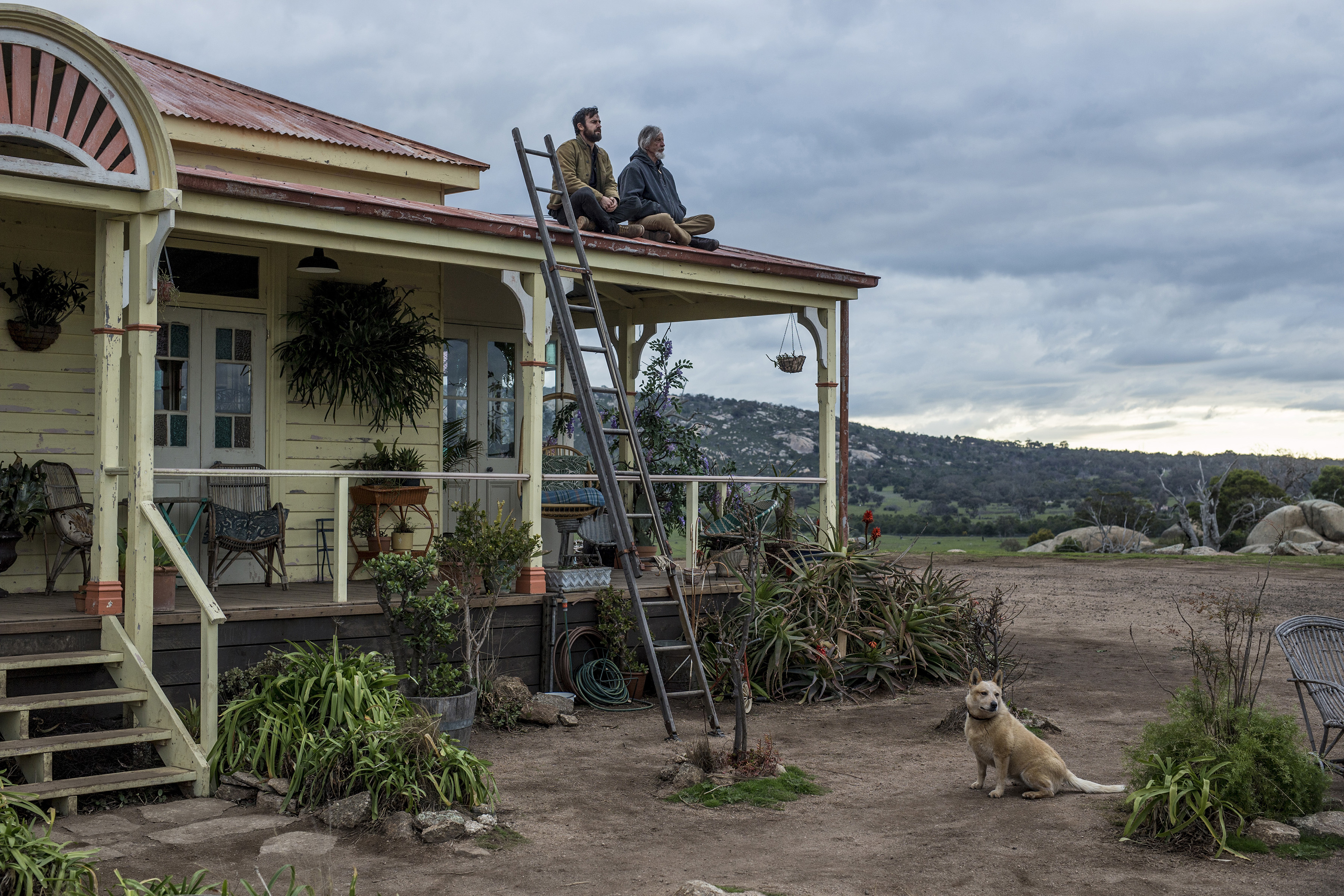The Leftovers episode 7 recap: Kevin Garvey finally finds meaning
In the show's penultimate episode, its wayward star stops running


A free daily email with the biggest news stories of the day – and the best features from TheWeek.com
You are now subscribed
Your newsletter sign-up was successful
To say that a show "teaches you how to watch it" sounds like damnation through faint praise, as if tuning in will up your cool quotient, but leave you craving the comfort of another Law and Order marathon as you roll your eyes at an hour of snotty abstruseness. Or it may, in fact, be the highest form of praise, suggesting that only the most astute and attuned viewer, the grand literati of pop culture, can appreciate the show's inscrutable artistry.
In truth, The Leftovers may be dense (and, at times, unintelligible), but it teaches us to connect more fully with our own feelings. The show resonates because it has gifted us with rich, consistent characterizations; familiar narrative and thematic rhythms; and images that are singular enough to stand alone. After all, The Leftovers' penultimate episode features a man literally ripping his heart out of his chest so that he can be with the woman he loves.
On almost any other show, a scene of the hunky male lead tearing his heart out over a lost love would be teenage poetry-bad, and likely presented in the context of a dream — but the moment Kevin Garvey reaches inside his own chest (well, okay, technically his secret assassin identical twin brother's chest, but we'll get to that) is so powerful because the dream, or the underworld, or the collective unconscious, or wherever the heck it is that Kevin Garvey goes when he ingests poison, or suffocates himself, or consents to being drowned, is so much more than a contextualizing device; it is a place of real depth and illumination. "The Most Powerful Man in the World (And His Identical Twin Brother)" is almost entirely set in the underworld (which is how I've come to think of it, a kind of blurred-boundary between the afterlife and Kevin's subconscious), where Kevin resumes his role as Kevin "Harvey," international assassin, while simultaneously existing as the president of the United States.
The Week
Escape your echo chamber. Get the facts behind the news, plus analysis from multiple perspectives.

Sign up for The Week's Free Newsletters
From our morning news briefing to a weekly Good News Newsletter, get the best of The Week delivered directly to your inbox.
From our morning news briefing to a weekly Good News Newsletter, get the best of The Week delivered directly to your inbox.
Kevin Harvey is out to kill President Kevin, and President Kevin is out to speak with the spirits of Grace Playford's five barefoot children, Evie Murphy, and Christopher Sunday (the holy man who was unceremoniously squashed by Kevin Senior), who will hopefully give him the right song to complete the songline and quell the coming flood. Given the decidedly Tom Clancy-esque nature of the scenario — a president facing an international crisis (the Ukrainians have stolen nuclear missiles and are poised to destroy the world!) and an identical twin sent to take him out (sent by whom?) — seems poised to become a meditation on power; this is particularly trenchant since the main action occurs on the seventh anniversary of the Departure (in case we've forgotten, the opening theme song is season one's sturm und drang), a day when humanity confronted its own astonishing powerlessness. However, this aspect of the episode winks at its own zaniness — in order to get into the crisis bunker, the president must do a biometric scan that includes slapping his penis down on a bio-reader; Assassin Kev whines pitifully when a commando smashes his sunglasses; and the vice president is a gun-toting, schoolmarm bun-wearing Meg — providing much-needed levity, but also allowing the real meaning to float to the fore: This episode isn't just about the end of the world, it's about what gives the world its meaning; it's about love.
Before Kevin sinks into the drink, and the hard rain comes bearing down, he has a vision of being with Nora in calmer waters; sitting in a candlelit tub and cracking dark jokes about what they'd like to do with their bodies after death. Nora wants to be cremated; Kevin wants to be taxidermied — Nora consents, but says she's going to put a beard on stuffed Kevin: "If I'm going to have sex with that abomination, I'm going to do what I want with it." Carrie Coon spins Nora's increasing bitterness into something sweeter and stickier, like cotton candy dyed blue; Kevin looks at her with a genuine adoration and admiration, as if he can't believe that this woman who has survived so much is still so smart, so funny, and still with him. Although, after "G'Day Melbourne," she's gone — and a desire to find out just how gone she really is animates his journey to the otherworld. He seeks her out in the crowd that has come to see President Garvey deliver his first address to the Australian people, a speech that advocates outlawing marriage, since matrimony is "the single most destructive idea in humankind." President Garvey has won on a Guilty Remnant-style platform, denouncing family, human attachment in general, and civilization itself.
Grace Playford's children are in the front row; young Liam has won an essay contest with his entry "Why I Don't Need a Mommy and Daddy." When Kevin tells him that his family wants to know where he put his shoes, he retorts that "there is no family." There's no anger or pain in his words, just a simple acknowledgement that he and his siblings are now free from worrying about whether Mommy and Daddy, those infinite beings of god-like love and authority, will ever bestow their mercies or their punishments again. It's terribly sad, of course, but from a child's perspective, it's also liberating. Evie Murphy crashes the rally as a dashing young activist who rejects President Kevin's message from her father, because, in her mind, her whole family was killed in a drone strike. It's a fitting afterlife for Evie, who wanted nothing more than to devote her waking life to a worthy crusade. The dead don't conform to John and Grace's visions of pining specters. They haven't been frozen in time, waiting for messages from their old world; they have their own ideas and agendas, and, all-in-all, they're doing okay — they could even teach the living a thing or two.
The happiest, snappiest member of the dearly departed is one Patricia Levin, secretary of defense. Ann Dowd clearly revels in the chance to play a more buoyant, bullish Patti, running roughshod over President Kevin in her white pumps, forcing him to take the security level down to Defcon One. When she finally reveals that the Ukrainian separatists didn't steal the missiles, that she and President Kevin concocted this ruse as a premise for launching their own nukes at Russia and instigating our mutually-assured destruction, she cackles with a cartoonish mirth: "We give the people what they want," she laughs. "Which is to die."
A free daily email with the biggest news stories of the day – and the best features from TheWeek.com
This may sound like an odd, incongruous thing to say, given that many of the characters have desperately pondered their own mortality, or outright tried to avert the apocalypse — and yet, in all this desperate pondering, in this trying to save the world, when have these people felt truly happy, truly alive? It's when they have, however fleetingly, connected with each other, loved each other, and built families. When Assassin Kevin finally raids the president's compound and sneak into a communications room to message Prime Minister Christopher Sunday, Sunday asks him if he truly believes that there is a song that can save the world; Kevin says no. "Then why are you here?" Sunday responds. In the command center, President Kevin tells Patti that he just wants to go home, and she reminds him that, for all his talk of home, he sure spends a lot of time in the underworld. The pondering and the world-saving has been the lit cigarette pumping tar into the clear lungs of a life that perseveres against terror.
Patti tells President Kevin that he conjured her, pulled her out of "retirement" (which, based on the quick flashback to Kevin drowning Patti in the well at the end of "International Assassin," ushering her spirit into peace and quietude, seems to be a deeper, more obscure plane of death). Now, she's here to help him do the thing he could never do on his own, the thing he must do if he's to truly rejoin the living — specifically, his lost Nora: Destroy the underworld. Assassin Kevin is captured and brought in front of President Kevin — who must pull a special key out from behind a chamber of his "brother's" heart and use this key to turn on the nuclear device. The two men stare at each other queasily until Patti pulls out another leather-bound "Book of Kevin," which is now a romance novel — then they start bickering over which of them would've written something so frivolous. Finally, President Kevin reads aloud this tale of a man who "wore the uniform of a brave man, but was a coward," as he sails away from his love on a boat called The Merciful: "He was too afraid of her. To lay beside her and be comforted by her. To show her that he was small … all of that was a nightmare. All he knew to do was run."
Finally, Assassin Kevin weeps for President Kevin to "take this thing out of me, so we can never come back here." Before he dies, he warns himself that "we f---ed up with Nora." The blood sputters and rushes all over President Kevin's white suit; the red, wet heat of life itself overtaking the cold blankness of cynicism and nihilism. Still, as Kevin stands, hand in hand with Patti, watching his hidden world blow to smithereens, he's redeemed the Guilty Remnant's old drumbeat of "remember" and given it a new tune. Remember everything that's been lost, but, remember to live. When he comes to on dry land, he finds his father sitting on Grace's rooftop; the heavy rains have ended. Maybe some quantum quirk of Kevin's actions in the underworld averted the flood. Maybe there was never going to be a flood, anyway. "What now?" Kevin Senior asks. Kevin Junior smiles sadly toward the sky. He doesn't know. He only knows that he's not running anymore.
Laura Bogart is a featured writer for Salon and a regular contributor to DAME magazine. Her work has appeared in The Atlantic, CityLab, The Guardian, SPIN, Complex, IndieWire, GOOD, and Refinery29, among other publications. Her first novel, Don't You Know That I Love You?, is forthcoming from Dzanc.
